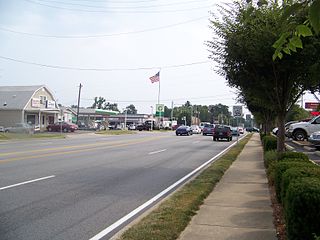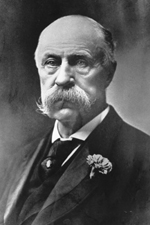
The 1896 United States presidential election was the 28th quadrennial presidential election, held on Tuesday, November 3, 1896. Former Governor William McKinley, the Republican nominee, defeated former Representative William Jennings Bryan, the Democratic nominee. The 1896 campaign, which took place during an economic depression known as the Panic of 1893, was a political realignment that ended the old Third Party System and began the Fourth Party System.

Whitley County is a county located in the southeastern part of the U.S. state of Kentucky. As of the 2020 census, the population was 36,712. Its county seat is at Williamsburg, though the largest city is Corbin, and the county's District Court sits in both cities. Whitley County is included in the London, KY Micropolitan Statistical Area.

Scott County is a county located in the central part of the U.S. state of Kentucky. As of the 2020 census, the population was 57,155. Scott County is part of the Lexington–Fayette, Kentucky Metropolitan Statistical Area.

Pulaski County is a county in the U.S. Commonwealth of Kentucky. As of the 2020 census, the population was 65,034. Its county seat is Somerset. The county was founded in December 1798 from land given by Lincoln and Green Counties and named for Polish patriot Count Casimir Pulaski. Pulaski County comprises the Somerset, KY Micropolitan Statistical Area. Somerset's population is just over 11,000, but the Micropolitan Area for Somerset/Pulaski County is over 65,000.

Leslie County is located in the U.S. state of Kentucky. Its county seat and largest city is Hyden. As of the 2020 census, the population was 10,513. It was formed in 1878 from portions of Clay, Harlan, and Perry counties, and named for Preston Leslie, governor of Kentucky from 1871 to 1875.

Mayfield is a home rule–class city and the county seat of Graves County, Kentucky, United States. The population was 10,017 as of the 2020 United States Census.

Lyndon is a home rule-class city in Jefferson County, Kentucky, United States. The population was 11,002 at the 2010 census, up from 9,369 at the 2000 census.

Georgetown is a home rule-class city in Scott County, Kentucky, United States. The population was 37,086 at the 2020 census. It is the 6th-largest city by population in the U.S. state of Kentucky. It is the seat of its county. It was originally called Lebanon when founded by Rev. Elijah Craig and was renamed in 1790 in honor of President George Washington. It is the home of Georgetown College, a private liberal arts college. Georgetown is part of the Lexington-Fayette, KY Metropolitan Statistical Area. At one time the city served as the training camp home for the NFL's Cincinnati Bengals.

John Griffin Carlisle was an American politician from the commonwealth of Kentucky and was a member of the Democratic Party. He was elected to the United States House of Representatives seven times, first in 1876, and served as Speaker of the House, from 1883 to 1889. He subsequently served as a U.S. senator from Kentucky, from 1890 to 1893, and then as Secretary of the Treasury, from 1893 to 1897, during the Panic of 1893. As a Bourbon Democrat he was a leader of the conservative, pro-business wing of the party, along with President Grover Cleveland.
"Gold bug" is a term frequently employed in the financial sector and among economists in reference to persons who are extremely bullish on the commodity gold as an investment and or a standard for measuring wealth. Depending on the circumstances the term can have one or a combination of closely related and often overlapping themes that extend beyond the support for gold as an investment, including in some cases the use of the term as a pejorative.

Free silver was a major economic policy issue in the United States in the late 19th-century. Its advocates were in favor of an expansionary monetary policy featuring the unlimited coinage of silver into money on-demand, as opposed to strict adherence to the more carefully fixed money supply implicit in the gold standard. Free silver became increasingly associated with populism, unions, and the struggle of ordinary Americans against the bankers, monopolists, and robber barons of the Gilded Age. Hence, it became known as the "People's Money".

Joseph Clay Stiles Blackburn was a Democratic Representative and Senator from Kentucky. Blackburn, a skilled and spirited orator, was also a prominent trial lawyer known for his skill at swaying juries.

The National Democratic Party, also known as Gold Democrats, was a short-lived political party of Bourbon Democrats who opposed the regular party nominee William Jennings Bryan in the 1896 presidential election. The party was then a "liberal" party in the context of the times, which is more of a fiscal-conservative or classical-liberal in the political context of the United States today.
A gold bug is a person who is bullish on gold and related investment products, and/or supports the use of the gold standard.

William Henry Hatch was a U.S. Representative from Missouri. He was the namesake of the Hatch Act of 1887, which established state agricultural experiment stations for the land-grant colleges. Hatch is also the namesake of Hatch Hall, a Residence Hall at the University of Missouri.
Meta is an unincorporated community in Pike County, Kentucky. Meta is located at the junction of Kentucky Route 1426 and Kentucky Route 2169 7.7 miles (12.4 km) northeast of Pikeville. The community had a post office from 1896 to 1959.

The London, Kentucky micropolitan area is made up of three counties in the Eastern Coalfield region of Kentucky. Before 2013, the area was officially known as the Corbin-London, KY Combined Statistical Area, and consisted of the Corbin Micropolitan Statistical Area and the London Micropolitan Statistical Area. The Corbin micropolitan area consisted of Whitley County, and the London micropolitan area consisted of Laurel County.
Joy is an unincorporated community in Livingston County, Kentucky, United States.

The 1896 United States elections elected the 55th United States Congress. Republicans won control of the Presidency and maintained control of both houses of Congress. The election marked the end of the Third Party System and the start of the Fourth Party System, as Republicans would generally dominate politics until the 1930 elections. Political scientists such as V.O. Key, Jr. argue that this election was a realigning election, while James Reichley argues against this idea on the basis that the Republican victory in this election merely continued the party's post-Civil War dominance. The election took place in the aftermath of the Panic of 1893, and featured a fierce debate between advocates of bimetallism and supporters of the gold standard.

The 1896 United States presidential election in Kentucky took place on November 3, 1896. All contemporary 45 states were part of the 1896 United States presidential election. Kentucky voters chose 13 electors to the Electoral College, which selected the president and vice president.

















